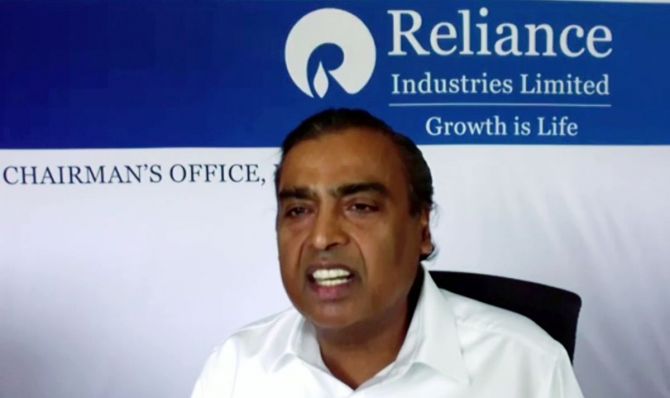The Delhi high court (HC) division Bench on Thursday sought a response from Reliance Industries (RIL) and others regarding the government’s appeal against the Mukesh Ambani-owned conglomerate and others for fraudulently and unjustly enriching themselves by draining gas from their deposits, amounting to over $1.5 billion.

The Centre had appealed against the single-judge Bench order of the Delhi HC on May 9, which had dismissed its petition.
Justice Anup Jairam Bhambhani had upheld the international arbitration award of July 24, 2018, in favour of the RIL-led consortium.
The consortium includes UK-based BP Plc and Niko Resources of Canada.
The May order reads, “This court is accordingly not persuaded to hold that the conclusions drawn by the arbitral tribunal are such that no reasonable person would reach.
"Suffice it to say that the view taken by the arbitral tribunal is most certainly a ‘possible view’, which calls for no interference.”
Attorney-General (A-G) R Venkataramani and former A-G K K Venugopal, both appearing for the Union government on Thursday, told the Bench of Justices Manmohan and Mini Pushkarna that RIL knew about the connectivity of their gas blocks with the adjoining gas blocks of Oil and Natural Gas Corporation (ONGC) as far back as 2003.
The government contended that RIL was guilty of fraud and unjust enrichment totalling over $1.5 billion.
The government told the court, “It is contended that the migrated gas alone was valued at about $1.5 billion as of June 30, 2016.”
The government also argued that RIL had claimed there was no connectivity between their block and the government’s, but they had consciously siphoned off gas from the ONGC block without the government’s knowledge.
They also argued that the arbitral award they challenged was “against India’s public policy”.
In May, the court observed that when an arbitral award is challenged, the court may interfere only if the award is induced or affected by fraud or corruption, or if it is in “contravention of the fundamental policy of Indian law’, or if it is ‘in conflict with the most basic notions of morality and justice”.
The order read, “In the opinion of this court, firstly, the aforesaid inferences are factual conclusions arrived at by the arbitral tribunal, which cannot be second-guessed by this court in exercise of its powers under Section 34 of the Arbitration and Conciliation Act, 1996 (grounds to challenge the arbitral award).
"Secondly, in the opinion of this court, the factual conclusions are perfectly rational, coherent, and logical, especially considering what was in the production sharing contract (PSC), a purely commercial transaction entered into by two contracting parties.”
On the other hand, RIL told the court that the same set of issues cannot be argued again under Section 34 of the Arbitration and Conciliation Act, 1996 when both the single judge of the HC and the arbitral tribunal had examined the issue.
The conglomerate also pointed out that the government could have looked into the migration of gas between two blocks in 2009 before one of them was given to RIL, but it chose not to.
It said it would have been unfeasible for them to siphon off gas as the ONGC block was still in its nascent stages.
The matter is likely to come up again in February.
The dispute between the government and RIL arose when ONGC, on July 22, 2013, wrote to the Directorate General of Hydrocarbons (DGH), stating that the gas pools of the Reliance block and the ONGC blocks appeared to be connected with the possible migration of gas between the two blocks.
RIL, the contractor of the KG-DWN-98/3 block in the Krishna-Godavari Basin off the coast of Andhra Pradesh, was accused of making a profit by draining and selling the gas that migrated from adjacent ONGC blocks.
This led ONGC to file a writ petition before the Delhi HC, in which the Ministry of Petroleum & Natural Gas (MoPNG), the DGH, and RIL were also made parties.
The petition was disposed of by the court by directing MoPNG to consider the report produced by the expert agency named DeGolyer & MacNaughton (D&M).
The agency was to undertake an independent third-party study to verify the claimed continuity and migration of gas from the ONGC blocks to the Reliance block.
D&M stated on November 19, 2015, that “the integrated analyses indicated connectivity and continuity of the reservoirs across the blocks operated by ONGC and RIL”.
MoPNG also appointed a one-man committee of Justice A P Shah, former chief justice of the Delhi HC, on December 15, 2015, to consider the D&M Report-2015 and recommend a future course of action in light of the findings contained in the report.
Based on the Shah Committee report, MoPNG raised a demand of $1.5 billion and $174 million for ‘unjust enrichment’ made by Reliance.
The total demand is $1.67 billion.
Reliance then approached the three-member tribunal headed by Singapore-based arbitrator Lawrence Boo.
The tribunal rejected the government's contention and stated that the PSC doesn’t prohibit the contractor from producing gas, irrespective of its source, as long as the producing wells were located inside the contract area.
The government then approached Delhi HC against this order.
After the single judge of the Delhi HC dismissed the government’s plea, the Centre appealed the order before the division Bench of the Delhi HC.











